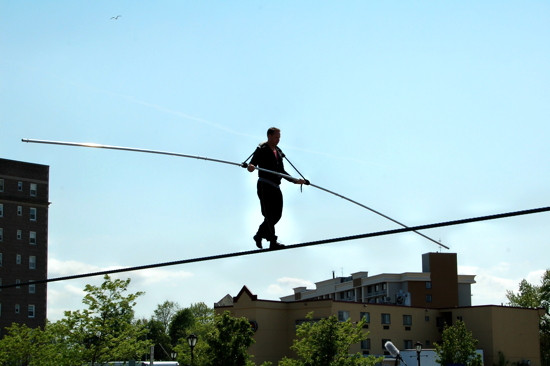You don’t have to be at the top to be lonely. Pioneers with new ideas know the feeling, too.
These thoughts came to mind after reading Patrick Allan’s (@mr_patrickallan) keen observations on a Lifehacker blog. On one post, he discusses “Build Your Creative Resilience with the Rejection You Receive” [link] pairing it with another post, “How (and Why) to Develop Your Mental Toughness” [link].
In the former post, which is short, Allan comes right to the point: “Trying to be creative and think outside of the box won’t always go in your favor. Rejection will knock you down constantly, but in actuality, that rejection is your training for developing strong creative endurance.”
In the latter blog post, which is much more detailed, he explains four major ways that a thought leader can avoid the pains of feeling apart, if not rejected, from an organisation because of one’s forward-thinking ideas. As he says at the end of the second post, “Developing mental toughness is a process and it’s not something you can conjure overnight. It takes a lot of patience and a conscious effort to become more resilient. Some things are bigger than all of us, but mental toughness can be your armor that glances the smaller blows away.”
Since nextsensing can be a process in which idea champions can feel rejected and alone, at least at first, here are a few observations I would add to the subject.
- Getting it wrong is part of getting it right. When someone puts forward a new idea, it is seldom (if ever) perfected and free from defects. Thus, it is normal for people to pull back from supporting the idea. The key is to press on: improve the idea, sharpen its selling points, and use the discomfort of being (in part) wrong as a motivator for making the idea more acceptable.
- Early on, seek feedback, not praise! Once a new idea is formed in one’s mind, it’s hard to avoid anticipating the roar of your audience when you present it. Then, too, often when someone asks a group — “So, what do you think?” — he or she is not truly seeking feedback but praise. Anything short of praise is taken as rejection. Real feedback is often painful, especially if you are passionate about the idea and thus emotionally attached to it. Real feedback is also invaluable: cherish it! While it is true that good creativity governance prohibits criticising ideas too early in the process, that does not always happen. Organisations should allow ideas to exist and encourage others to consider them without prematurely ditching them. If you are facing harsh rejection for your ideas, one way to counter it is to request that your idea be given a “premortem” (as opposed to postmortem) and try to build on the criticisms that others present on why your idea may seem dead on arrival.
- Being a pioneer is not being being secretive. I have met people with great ideas, ones that could truly change the future of their company. But the fear of rejection means that they keep the lid on their ideas. They believe that the ideas, locked safe in a desk, file cabinet or hard drive, will remain safe and unchallenged. They’re right. And as a result the idea goes nowhere. Ever.
- Anticipate the organisational immune system. Every firm seems to enjoy the status quo, even when it is no longer a viable operating plan. The firm’s immune system provides a natural defence against new ideas and change in general. Like our body’s immune system, such a defence serves an important role for organisations (for, indeed, some ideas could be destructive). Yet, all ideas are not bad ideas, so overcoming a corporate immune system is the explicit work of the creative and the innovative. Know your enemy, so to speak, and prepare your arguments accordingly. Good ideas must be defended against unjust criticism.
- Always remember that innovation happens at its own rhythm. An idea must start in the head of one person, but — to thrive — the idea must eventually gain social validation (with colleagues and customers) so it can be readied for the organisation as a whole. If you try to skip steps or jump ahead prematurely, you and your idea will struggle. It is critical that your selling of the idea fall in sync with the wider organisation — from planning cycles and capital budgeting to finding the best time to seek acceptance. Pushing ahead and perseverance are paramount here, but so is timing. Know when to raise your head and your hand and know when to bear down and fly under the radar.
Nancy Astor, the first woman to be elected to the British Parliament (1919), once commented, “Pioneers may be picturesque figures, but they are often rather lonely ones.” Yet, from what I have seen, if pioneers persevere and manage their ideas and their own presence correctly, that loneliness is only temporary.

